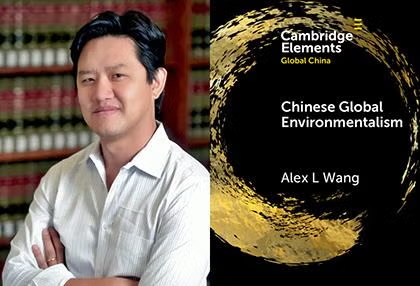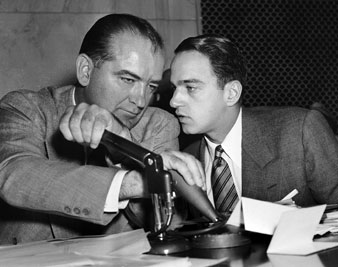Academia
Is China a Climate Hero? It’s complicated
UCLA’s Alex Wang explains China’s climate strategies and contradictions in his new book, Chinese Global Environmentalism.
Though China was once viewed as a climate villain, the country now dominates the global supply chains of solar panels, batteries, and electric vehicles. Just this month, Chinese manufacturer BYD overtook Tesla as the world’s biggest maker of EVs. It’s the latest example of how China’s focus on clean technology is setting the pace for …
Continue reading “Is China a Climate Hero? It’s complicated”
CONTINUE READINGIn the Cross Hairs
The Right has taken umbrage at some of the important work of environmental law professors and centers.
The fossil fuel industry and its conservative allies seem to have taken notice of the important work done by environmental law centers. Their response is to try to repress this valuable work. This is a backhanded acknowledgement that law schools are making a difference.This campaign has targeted some of the law schools with the most prominent environmental law programs. Climate scientists have long been the target of harassment and public attack. It appears that people who work on climate policy are now also in the crosshairs. What we’re seeing lacks the drama of other attacks on free speech and academic freedom. But it is capable of being no less harmful. McCarthyism writ small is still McCarthyism.
CONTINUE READINGA Science-Policy Dialogue on SRM for Latin America
Key takeaways from the UCLA Emmett Institute’s convening on Solar Radiation Modification (SRM) in Santiago, Chile.
Though interventions like solar radiation modification (SRM) are increasingly breaking into mainstream conversations of climate change, the charged nature of this topic and political extremes that have characterized discussion around it make it difficult for policymakers and decision-makers to find neutral spaces to learn about existing research, ask questions, and brainstorm policy ideas with colleagues and trusted experts. Creating that neutral space was the goal of an Emmett …
Continue reading “A Science-Policy Dialogue on SRM for Latin America”
CONTINUE READINGDoes the Unitary Executive Theory Exist? Not really.
It’s just another ideological confection to impose right-wing policies: the Supreme Court’s argument last week shows it
At Legal Planet, we often bemoan and gnash our teeth at the Unitary Executive Theory, which supposedly holds that because “the Executive Power shall be vested in the President of the United States,” Congress can not circumscribe the President’s removal authority or even his ability to manage federal agencies in any way. But last week, …
Continue reading “Does the Unitary Executive Theory Exist? Not really.”
CONTINUE READINGAlejandro Camacho Joins UCLA Law Faculty
Camacho will be a core faculty member of the UCLA Emmett Institute and a contributor to Legal Planet.
At this critical moment in environmental law, the Emmett Institute at UCLA School of Law keeps growing stronger. We are pleased to welcome Alejandro Camacho, a renowned regulatory scholar, as a professor of law. Camacho will be a core faculty member of the Emmett Institute on Climate Change and the Environment and a faculty affiliate of …
Continue reading “Alejandro Camacho Joins UCLA Law Faculty”
CONTINUE READINGCrafting a Roadmap for Zonal Decarbonization in California
A new series of briefs from the UCLA Emmett Institute offers legal insights for the gas transition. First up: SB 1221.
California has a $43 billion problem: that is the estimated cost of maintaining the state’s gas network over the next twenty years. That is an astronomical amount to spend on what state policy dictates will eventually become stranded assets: California won’t be able to meet its ambitious climate goals unless it moves away from natural gas altogether, so retirement of these assets is …
Continue reading “Crafting a Roadmap for Zonal Decarbonization in California”
CONTINUE READINGCalifornia Must Go Big to Save Big
A new Emmett Institute report shows how California can shift existing infrastructure spending from gas to electric to make homes and energy more affordable.
By Guest Contributor Craig Segall. California can still build big things – and in a new report today, my Emmett Institute co-authors, Denise Grab and Brennon Mendez, and I call for policymakers to think big on our energy system too. The headline: Tens of billions of dollars, annually, are available to make our homes cleaner …
Continue reading “California Must Go Big to Save Big”
CONTINUE READINGCan Bioplastics Be Composted? UCLA Clinic Investigates
See how bioplastic packaging interacts with California’s waste system as UCLA’s Environmental Legislation Clinic tours facilities across the state.
A student team from UCLA’s California Environmental Legislation and Policy Clinic has been conducting research for a project on bioplastics through field visits at waste management sites up and down the state, from Sun Valley to Northern California. These clinic field trips have been really fascinating and a little smelly. Clinic student Maddie Lincoln describes …
Continue reading “Can Bioplastics Be Composted? UCLA Clinic Investigates”
CONTINUE READINGMaking the Most of Data Centers
Data centers are driving energy demand at unbelievable scale. Regulators should use that to build infrastructure we desperately need.
If you’d asked me three years ago, I would never have guessed energy bills would be a salient political issue in 2025, let alone one that politicians anchor their entire campaign around. But of course, the cost of energy is quite different today than it was a few years ago. Electricity prices have increased faster than (already-high) inflation since 2022, leaving ratepayers on the hook for ever steeper …
Continue reading “Making the Most of Data Centers”
CONTINUE READINGYes, It’s That Time of Year Again
If you read Legal Planet, you know why the work we do matters.
Like everyone else, I’m sure you find fundraising appeals annoying. That’s why we only do them twice a year. But there couldn’t be a more important time for the work we do, given the urgency of the climate crisis and the ongoing policy disaster in D.C.
Trump’s second term has proved to be even more ruinous than expected for the environment, with a dedicated effort to slash pollution regulation, suppress clean energy, and glorify fossil fuels. That makes the environmental work we do at Berkeley and UCLA more urgent than ever.
CONTINUE READING













